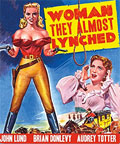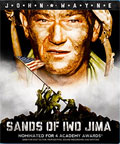Sands of Iwo Jima / Woman They Almost Lynched
Olive Films
Cast: Richard Jaeckel, John Wayne, Forrest Tucker, Brian Donlevy, Audrey Totter
Extras: None
Rating:
Allan Dwan started directing movies in 1911 and continued until 1961, racking up somewhere around 400 credits in fifty years. Yet today he’s more or less forgotten, in spite of efforts by disciples like Peter Bogdanovich and film scholar Frederic Lombardi to keep his reputation alive. The sheer volume of his output is singular, but it’s also one of the reasons Dwan remains underrated; throughout his career he was the kind of filmmaker who would always rather be working than not, and that meant that often he took on assignments that were beneath him, with substandard scripts or limited resources. Even many of his lesser movies, however, were elevated by Dwan’s wit and generosity; he was a director with a seemingly inextinguishable curiosity about his fellow man, and his expansive world view couldn’t help but infect his work. He did everything from comedies and swashbucklers to war films and Shirley Temple vehicles, and the common thread is an empathetic yet slyly satirical approach to character and an astonishing attention to detail in the casting – there are no throwaway characters or performances in an Allan Dwan film.
Dwan’s strengths are on full display in two films recently issued on Blu-ray by the good people at Olive Films. The 1949 “Sands of Iwo Jima” is probably the director’s most famous movie, a masterful World War II epic starring John Wayne, who was nominated for an Oscar for his work in the film. It’s an iconic work – so iconic that in a weird way it’s just as underrated as many of Dwan’s lesser known pictures, as it remains a film more talked about than seen.
Revisiting it on Blu-ray, one is astonished by how fresh and alive it feels – the dialogue crackles, the ensemble cast gives rich, layered performances filled with poignancy and humor, and the action is vivid and dynamic. Wayne is at his absolute best in a role just as powerful as his more celebrated turns in John Ford’s “The Searchers” and Howard Hawks’s “Red River”; as the ultra-professional but deeply troubled Sgt. John Stryker, he’s alternately tough, moving, tragic, and hilarious.

Four years after “Sands,” Dwan made the idiosyncratic Western “Woman They Almost Lynched,” a criminally overlooked masterpiece thankfully rescued from obscurity by Olive. The movie tells the story of Sally Maris, a young woman who arrives in a neutral border town in the waning days of the Civil War and finds herself at the center of an adventure involving real-life Western legends Jesse James, Charles Quantrill, and Cole Younger. There’s virtually nothing historically accurate about this colorful period piece, which takes its characters into the realm of pure myth and spins a yarn that couldn’t be more delightful – it’s filled with unpredictable twists and turns and jaw-dropping set pieces, including one of the best woman-on-woman brawls ever seen in a Western. Indeed, as played by Joan Leslie, Sally is one of the more original heroines of her era, and her relationship with Quantrill’s wife (Audrey Totter) is remarkable – it’s far more adult, nuanced, and unique than one would expect from a B-Western of the era.
Then again, that was always one of Dwan’s strengths – not only transcending his limitations but taking advantage of the limited risk inherent in low budgets to do work more innovative and audacious than that of his more high-profile peers. Working under the radar in “Woman They Almost Lynched,” he turns in a supremely enjoyable and sophisticated genre piece that deserves to be recognized alongside more popular cult Westerns like “Johnny Guitar” and “Forty Guns.”
The Blu-ray editions of both it and “Sands of Iwo Jima,” with their pristine 1080p transfers, offer the perfect opportunity to begin reappraising one of the greatest—and most all-out entertaining—directors in American history. The discs are no-frills movie-only editions, but the movies themselves are indispensable.







